Contents
- What To Expect From a 6-Month-Old German shepherd
- 6 Month Old German shepherd Puppy Schedule
- How Big is A 6-Month-Old German shepherd?
- How Much Do You Feed Your 6-Month-Old German shepherd?
- How Much Sleep Does A 6-Month-old German shepherd Puppy Need?
- How Much Exercise Does A 6-Month Old German Shepherd Need?
- Training Your 6 Month German shepherd
- 6-Month-Old German Shepherd Behavioral Patterns And How To Deal With Them
- Precautions For Raising The 6 Month Old German shepherd
- Conclusion
The six-month-old German Shepherd is a remarkable creature. At this age, they have already undergone significant growth and development since their birth, and they are continuing to grow and learn at a rapid pace.
At six months old, the German Shepherd puppy is becoming more coordinated and agile. They are starting to display an incredible amount of energy and enthusiasm for everything around them, including playtime, training, and exploring their environment.
As their physical abilities improve, their cognitive abilities are also developing. They are learning to think, reason, and problem-solve in new ways, and they are becoming increasingly responsive to their owner’s commands and cues.
However, despite their impressive progress, six-month-old German Shepherds still require a great deal of patience and consistency in their training. As they continue to grow, they will need to develop good habits and behaviors that will last a lifetime.
Fortunately, German Shepherds are highly intelligent and trainable dogs, and with the right approach, owners can help their puppies develop into well-behaved, loyal companions.
Whether you are an experienced dog owner or a first-time pet parent, a six-month-old German Shepherd can bring joy and excitement into your life. With their boundless energy, intelligence, and loyalty, they are sure to become a beloved member of your family for years to come.
Related posts:
- 8 Week Old German Shepherd: Loyal, Energetic, Active Canine Partner
- 3 Month Old German Shepherd: A Busy, Active, Playful Ball of Energy
- 4 Month Old German Shepherd: Cute, Active, Curious Puppy
- 5 Month Old German Shepherd: Curious, Energetic, Calm Puppy
What To Expect From a 6-Month-Old German shepherd
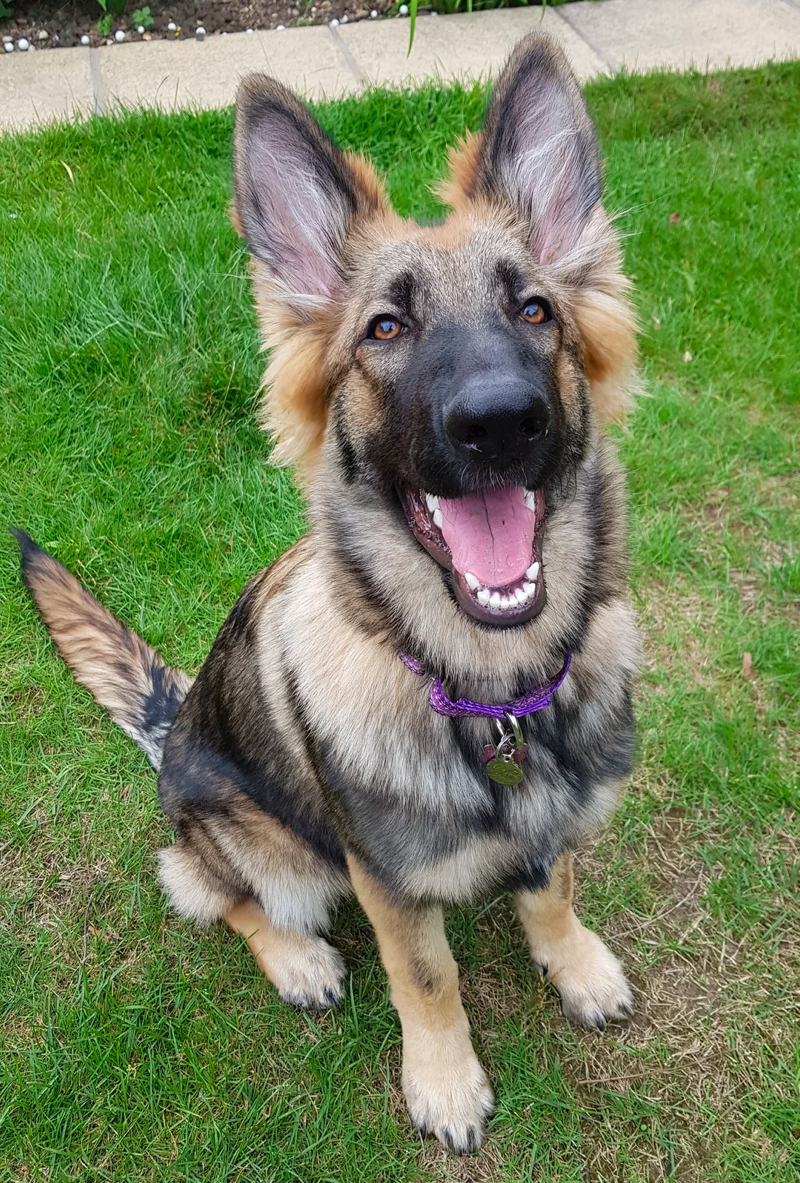
German Shepherds are a popular breed of dog that is known for their loyalty, intelligence, and high energy levels. At 6 months old, a German Shepherd puppy is still in the early stages of development, but they have already started to show some distinct characteristics that will give you a good idea of what to expect as they grow into adulthood.
One of the most noticeable traits of a 6-month-old German Shepherd puppy is its energy level. These dogs have a lot of energy and require plenty of exercise and playtime to keep them physically and mentally stimulated. At this age, they may become restless and even destructive if they do not get enough exercise or mental stimulation. It’s important to make sure they get plenty of opportunities to run, play, and explore.
Another characteristic of 6-month-old German Shepherd puppies is their curiosity and desire to explore their surroundings. They may start to test boundaries and push their limits as they try to understand their world. This can lead to some mischievous behavior, such as chewing on objects or digging in the yard. However, with proper training and supervision, these behaviors can be redirected in a positive way.
At 6 months old, German Shepherd puppies may also start to display some protective behaviors. They may become more vocal and alert when strangers or other animals approach, and they may even start to show signs of guarding behavior. While it’s important to encourage your puppy to be protective of you and your home, it’s also essential to ensure that they do not become aggressive or fearful towards others.
Finally, a 6-month-old German Shepherd puppy may start to show signs of intelligence and trainability. These dogs are highly intelligent and excel in activities such as obedience training, agility, and tracking. With consistent training and positive reinforcement, they can learn a wide variety of commands and behaviors.
6 Month Old German shepherd Puppy Schedule
Having a 6-month-old German Shepherd puppy is an exciting time. At this age, your puppy is more active and playful, and you can expect them to have a lot of energy. To help you manage life with your German shepherd puppy, it’s important to establish a schedule that includes plenty of exercise, socialization, and training. Here are some tips to help you create a schedule for your 6-month-old German Shepherd puppy:
Morning Routine
Start your day early by taking your puppy for a walk or a jog. German Shepherds are a high-energy breed that needs plenty of exercise to stay healthy and happy. You can also use this time to practice basic obedience training, such as sit, stay, and come.
Breakfast Time
After the morning exercise, it’s time to feed your puppy breakfast. Make sure you feed them high-quality dog food that is appropriate for their age and size. It’s also a good idea to establish a feeding routine, which helps your puppy understand when it’s time to eat and prevents overeating.
Mid-Morning Playtime
Playtime is essential for a growing puppy. You can use this time to engage in interactive play with your puppy, such as fetch or tug-of-war. You can also provide them with chew toys to keep them occupied and prevent destructive behavior.
Lunch Break
At mid-day, your puppy may need a break. If you’re at home, you can let them out to relieve themselves and get some fresh air. If you’re not home during the day, consider hiring a dog walker or asking a neighbor to help.
Afternoon Training
The afternoon, it’s a good time to focus on training. You can practice obedience training and work on more advanced commands, such as heel or stay. You can also use this time to introduce your puppy to new experiences, such as meeting new people or exploring new environments.
Dinner Time
Just like breakfast, dinner time is an essential part of your puppy’s feeding routine. Make sure to feed them a balanced meal that meets their nutritional needs.
Evening Walk
End the day with a brisk walk or jog. This helps your puppy burn off any excess energy and prepares them for a good night’s sleep.
Bedtime Routine
Establishing a bedtime routine helps your puppy understand when it’s time to settle down for the night. You can use this time to provide your puppy with a comfortable sleeping space and some quiet time to relax.
How Big is A 6-Month-Old German shepherd?
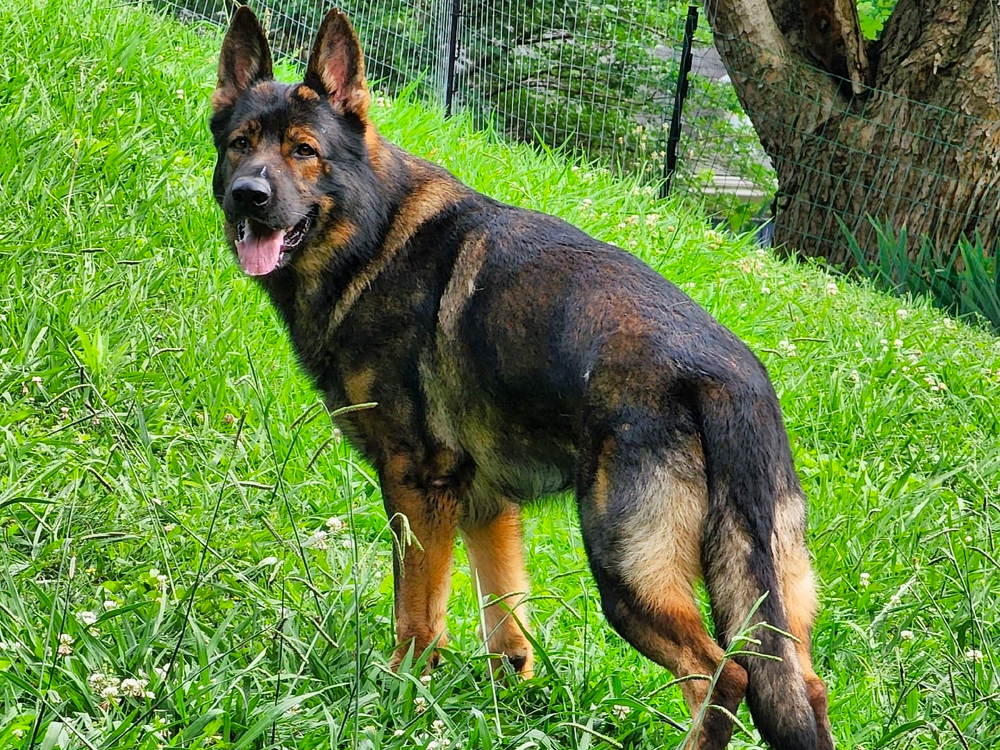
At six months old, a German Shepherd puppy is well on their way to reaching adult size, although it may still have some growing to do. On average, a six-month-old male German Shepherd will weigh between 50 and 70 pounds (23-32 kg), while a female German Shepherd of the same age will weigh between 40 and 60 pounds (18-27 kg).
It’s important to keep in mind that each individual puppy may vary in size depending on their genetics, diet, and level of physical activity. Additionally, German Shepherds are a large breed of dog, and their growth rate can be affected by their environment, health, and other factors.
It’s important to provide your German Shepherd puppy with a healthy diet, regular exercise, and plenty of opportunities for socialization and training to help them grow into a well-rounded adult dog.
How Much Do You Feed Your 6-Month-Old German shepherd?
Feeding your 6-month-old German Shepherd puppy the right amount of food is crucial for their growth and development. At this age, your puppy will be growing rapidly and require a balanced diet to fuel their energy needs.
The amount of food your 6-month-old German Shepherd puppy needs will depend on their size, activity level, and overall health. Generally, a 6-month-old German Shepherd puppy should be fed around 3-4 cups of high-quality dry kibble per day, divided into two or three meals.
It’s important to choose high-quality dog food that meets your puppy’s nutritional needs. Look for a food that contains a good balance of protein, carbohydrates, and fats, and is specifically formulated for large-breed puppies.
You should also consider your puppy’s activity level when determining how much to feed them. If your puppy is very active, they may need more food than a more sedentary puppy. Be sure to monitor your puppy’s weight and adjust their food intake accordingly.
In addition to providing your puppy with a balanced diet, it’s also important to ensure they have access to fresh water at all times. Regular exercise and veterinary check-ups are also important for your puppy’s overall health and well-being.
How Much Sleep Does A 6-Month-old German shepherd Puppy Need?
Just like humans, puppies require an adequate amount of sleep for their overall health and development. At 6 months old, a German Shepherd puppy should be sleeping for approximately 14-16 hours per day.
It’s essential to provide your 6-month-old German Shepherd puppy with a comfortable and cozy sleeping area to encourage healthy sleep habits. Your puppy’s sleeping area should be quiet, dark, and free from any distractions that may interfere with their rest. You may also consider providing a cozy bed or crate with a soft blanket to help your puppy feel secure and comfortable.
German shepherd puppies may not sleep for long periods at a time and may wake up frequently during the night. As your puppy gets older, it will gradually begin to sleep for longer periods at night and require fewer naps during the day.
Additionally, providing your German Shepherd puppy with regular exercise and mental stimulation throughout the day can help promote better sleep habits.
How Much Exercise Does A 6-Month Old German Shepherd Need?
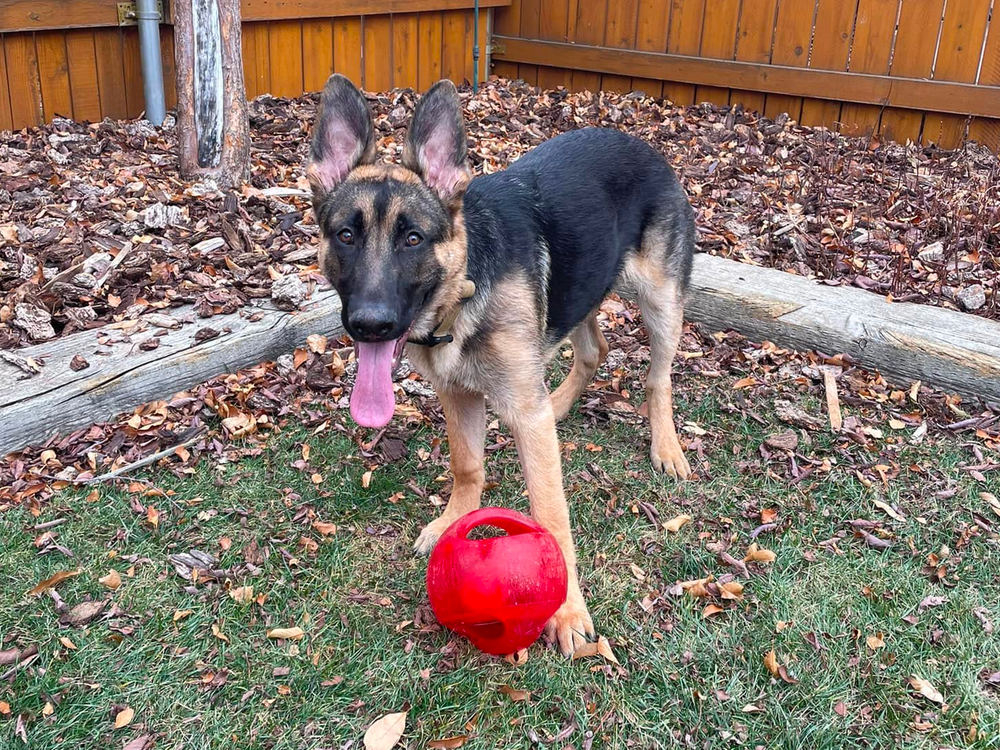
A 6-month-old German Shepherd puppy needs a lot of exercise to maintain their physical health and mental well-being. German Shepherds are active and energetic dogs, so regular exercise is necessary for them to stay happy and healthy.
At this age, a German Shepherd puppy needs at least 60 minutes of exercise per day, divided into two or three sessions. Exercise can take many forms, including walking, running, playing fetch, or going to the dog park. Always keep in mind that exercise should be appropriate for the age and physical abilities of the puppy.
It is also essential to monitor the temperature outside during exercise as German Shepherds are prone to heatstroke. Exercise should be avoided during the hottest parts of the day, and plenty of water should be available to the puppy.
In addition to physical exercise, mental stimulation is also important for a 6-month-old German Shepherd puppy. Games that challenge their mind and encourage problem-solving, such as hide-and-seek or puzzle toys, can help keep their minds sharp. Every puppy is unique, and their exercise needs may vary based on factors such as size, energy level, and overall health.
Training Your 6 Month German shepherd
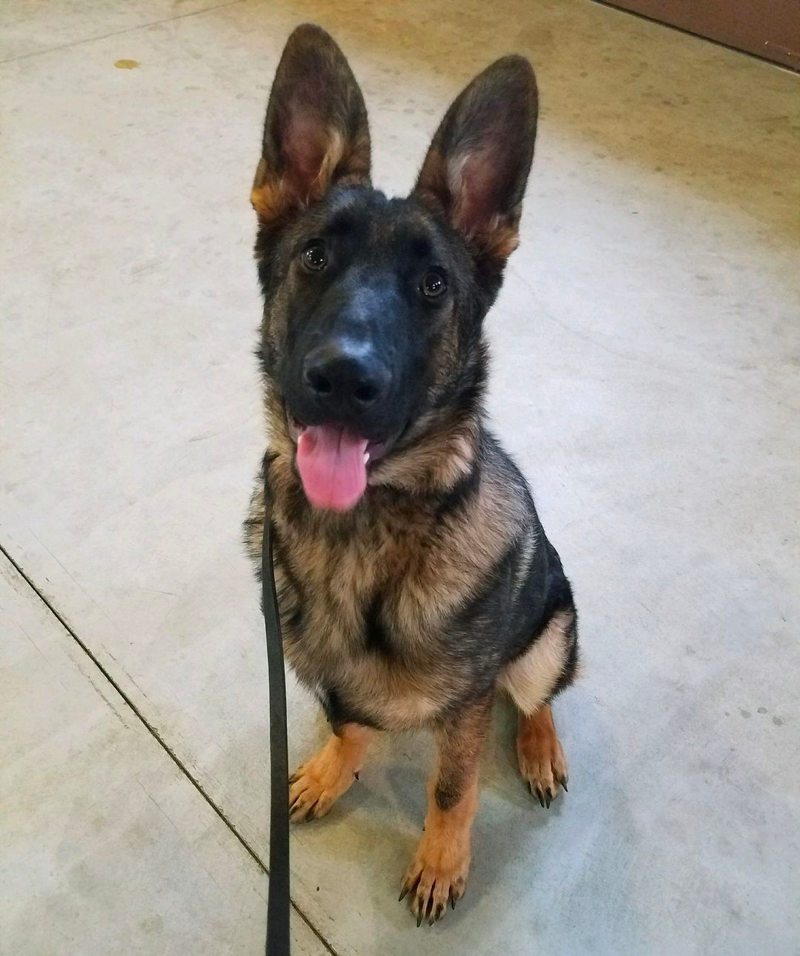
Training your 6-month-old German shepherd is an essential aspect of ensuring they become well-behaved and obedient adult dogs. At this age, your puppy is likely to be full of energy and curiosity, and may also start to display some challenging behaviors. Therefore, it is important to start training your German shepherd early to establish good habits and prevent unwanted behaviors from developing.
One of the most important aspects of training your German shepherd puppy is socialization. This involves exposing them to a variety of people, animals, and environments to help them develop good behavior and social skills. Make sure to expose your puppy to different sounds, textures, and smells to help them get used to new situations.
You should train your German shepherd puppy to behave appropriately around other dogs and animals. They should learn to be friendly and play nicely with other dogs and not chase or harass smaller animals.
Consistency and patience are key when training a German shepherd puppy. Training sessions should be short and frequent, and you should always end on a positive note. You should remain calm and avoid punishing your puppy, as this can lead to fear and anxiety. Instead, focus on positive reinforcement and reward-based training to help your German shepherd puppy learn and develop into a well-behaved adult dog.
6-Month-Old German Shepherd Behavioral Patterns And How To Deal With Them
At six months old, a German Shepherd puppy is starting to establish their personality and behavioral patterns. This can be an exciting time, but it can also be challenging as you navigate your pup’s newfound independence and stubbornness. Here are some common behavioral patterns you may see in your 6-month-old German Shepherd puppy and how to deal with them:
Biting and Nipping
At six months old, German Shepherd puppies are still teething. Biting and nipping are common behaviors. To deal with this behavior, provide your pup with plenty of chew toys and redirect their attention when they start biting or nipping. You can also teach them the “leave it” command to discourage this behavior.
Jumping
German Shepherds are high-energy dogs, and jumping up on people is a common behavior. To deal with this, teach your pup the “off” command and provide them with plenty of exercises to help burn off excess energy.
Separation Anxiety
At six months old, German Shepherds can start to develop separation anxiety as they become more attached to their owners. To prevent this, gradually increase the amount of time you spend away from your pup, and provide them with plenty of toys and activities to keep them occupied when you’re not around.
Fear and Aggression
German Shepherds can be protective and territorial dogs, which can lead to fear and aggression towards strangers or other animals. To deal with this behavior, socialize your pup from a young age and provide them with plenty of positive reinforcement when they interact with others.
Leash Pulling
As German Shepherds grow, they can become strong pullers on the leash. To deal with this behavior, train your pup to walk calmly on a leash using positive reinforcement techniques and a no-pull harness.
Precautions For Raising The 6 Month Old German shepherd
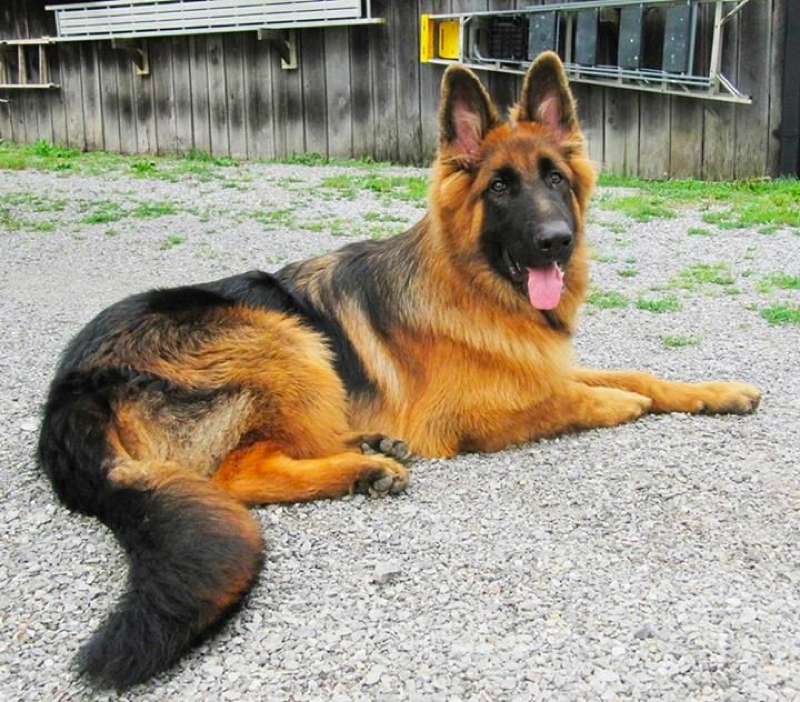
Raising a 6-month-old German Shepherd puppy requires a lot of attention and care. As a responsible owner, you should take certain precautions to ensure the health and well-being of your pet. Here are some precautions to keep in mind:
Provide Proper Nutrition
Your German Shepherd puppy’s diet should consist of high-quality dog food that provides all the essential nutrients required for their growth and development. Ensure that you feed them the right amount of food, as overfeeding can lead to obesity and other health issues.
Exercise Regularly
German Shepherds are active dogs and require regular exercise to keep them healthy and happy. Take your puppy for walks, and runs, and engage them in playtime to ensure they get enough physical activity.
Socialization
German Shepherds are known to be protective of their owners and can be aggressive toward strangers. Socialization is crucial in shaping their behavior, and you must expose your puppy to various people, environments, and other animals to avoid developing behavioral issues.
Training
Training your German Shepherd puppy is essential in shaping their behavior and ensuring they respond appropriately to your commands. Positive reinforcement training techniques work best for German Shepherds, and you can enroll them in obedience classes or hire a professional trainer to help with their training.
Health Checkups
Regular visits to the veterinarian are essential to ensure your German Shepherd puppy is healthy and up-to-date with their vaccinations. They can also check for any underlying health conditions and provide you with advice on how to take care of your pet.
Safe Environment
German Shepherds are curious animals and can easily get into trouble. Ensure your home is safe for your puppy, and keep harmful substances out of reach.
Conclusion
It’s important to remember that every dog is unique and may have different needs and behaviors, but with proper care, training, and attention, your 6-month-old German Shepherd can become a loyal and well-behaved companion. Make sure to consult with your veterinarian and do your research before making any major decisions regarding your dog’s diet, exercise routine, or training plan. With patience, consistency, and love, you and your German Shepherd can enjoy a long and happy life together.

 4 Month Old German Shepherd: Cute, Active, Curious Puppy
4 Month Old German Shepherd: Cute, Active, Curious Puppy